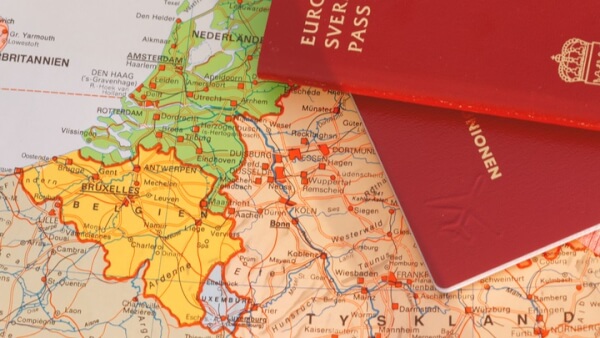Bank and public holidays in Belgium: 2017-2018 guide
Belgium is a melting pot of French, German and Flemish people, and that certainly affects the holidays that are celebrated in the country. Some holidays are...

Considering moving to Belgium from the UK? One of the first things you’ll need to read up on is the country’s tax system, to see how it applies to you and your family.
One potentially complicated part of it is inheritance tax. It can be useful to know about this, especially if you have Belgian relatives or have retired to Belgium and plan to see out your days there.
In this comprehensive guide, we’ll cover all the essentials you need to know about inheritance tax in Belgium. This includes rates, allowances and exemptions, as well as how to calculate and pay inheritance tax there.
It’s still strongly recommended to get professional tax advice, but this information can act as a useful starting point.
We’ll also show you how to send large amounts of money securely between countries using the Wise Account. This can be extremely useful if you have inheritance tax to pay, or want to send money from an inheritance back to the UK.
| Table of contents |
|---|
Inheritance tax, known as IHT in the UK, is a tax paid to the government on the estate of someone who has died. The ‘estate’ usually encompasses all property and possessions, as well as savings, investments and pensions.
Many countries have inheritance tax systems. Depending where in the world you are, the tax may be known as estate tax, inheritance tax or succession tax.
However, not all countries have this kind of tax in place. New Zealand, Singapore, Portugal and Canada are among a handful of countries which don’t charge inheritance tax at all.¹
Belgium does have an inheritance tax system, where rates, conditions and exemptions vary depending on where in the country the deceased person lived.
The main areas are the Brussels Capital Region, the Walloon Region and Flanders, which all have their own tax authorities responsible for inheritance tax. However, the national Federal Public Service (FPS) agency handles the execution of inheritance tax matters.² In Flanders, inheritance tax is known as estate duties.
Unlike in the UK where inheritance tax is payable by the estate, in Belgium it’s payable by each beneficiary individually.
Each person has a tax-free personal allowance, which varies depending on the region and the closeness of the relationship between the heir and deceased person (for example, the allowance is usually higher for spouses).
Beneficiaries will have to pay tax on anything they inherit above this threshold, with rates set in tiers according to the value of the inheritance and their relationship to the deceased person.
Belgian inheritance taxes are payable on all assets and property located in Belgium, no matter whether the deceased person was a Belgian national or not.³ This means that if you live in the UK and you receive an inheritance from abroad - and it’s physically located in Belgium - then you may have Belgian inheritance tax to pay.
It’s also due when assets are located outside of Belgium (with the exception of real estate property) but are owned by either a Belgian national or a foreign national resident in Belgium for tax purposes.³
Each beneficiary will need to pay inheritance tax to the authorities. This is different to how it works in the UK, where a lump sum of tax is paid out of the estate.
It’s important to get professional tax advice to double check which country’s tax laws apply to you, especially if you live between countries or have property in multiple countries.
In the UK, a flat rate of tax is applied to estates valued over a certain sum. However, it works differently in Belgium.
The Belgian system uses tax rates which vary depending on the relationship of the beneficiary to the deceased, and the value of the inheritance. Each region will also apply its own rates, exemptions and personal allowances.
To illustrate this, let’s take a look at the current inheritance tax rates and personal allowances in the Brussels Capital Region:²
| Relationship to deceased | Personal tax-free allowance (EUR) | Value of inheritance (EUR) | Inheritance tax rate |
|---|---|---|---|
| Spouse, children, grand-children, parents | 15,000 (+2,500 for children under 21) | 0 to 50,000 | 3% |
| 〃 | 〃 | 50,000 to 100,000 | 8% |
| 〃 | 〃 | 100,000 to 175,000 | 9% |
| 〃 | 〃 | 175,000 to 250,000 | 18% |
| 〃 | 〃 | 250,000 to 500,000 | 24% |
| 〃 | 〃 | 500,000+ | 30% |
| Siblings | 1,250 | 0 to 12,500 | 20% |
| 〃 | 〃 | 12,500 to 25,000 | 25% |
| 〃 | 〃 | 25,000 to 50,000 | 30% |
| 〃 | 〃 | 50,000 to 100,000 | 40% |
| 〃 | 〃 | 100,000 to 175,000 | 55% |
| 〃 | 〃 | 175,000 to 250,000 | 60% |
| 〃 | 〃 | 250,000+ | 65% |
| Uncles, aunts, nephews and nieces | 1,250 | 0 to 50,000 | 35% |
| 〃 | 〃 | 50,000 to 100,000 | 50% |
| 〃 | 〃 | 100,000 to 175,000 | 60% |
| 〃 | 〃 | 175,000+ | 70% |
| Other heirs | 1,250 | 0 to 50,000 | 40% |
| 〃 | 〃 | 50,000 to 100,000 | 55% |
| 〃 | 〃 | 100,000 to 175,000 | 65% |
| 〃 | 〃 | 175,000+ | 80% |
Under Belgian inheritance laws, any assets located in Belgium are considered to be taxable assets. Also, assets that are overseas but are owned by someone who is either a Belgian national or resident in Belgium for tax purposes - with the exception of real estate.³
However, each region has its own exemptions. Across all three (Brussels, Walloon and Flanders) there is some level of exemption for the family home.
Here are some of the main inheritance tax exemptions and reductions for the Brussels Capital Region:
Here’s an overview of how Belgian inheritance tax can be calculated:
If you are a beneficiary who is liable for inheritance tax in Belgium, you must file a declaration of estate’. This must be submitted to the national FPS Finance authority, or to the Flemish tax administration if the deceased person lived in Flanders.
You must pay any inheritance tax owed within two months of the deadline for filing this declaration. If you’re late, you could face an extra interest charge of 7% - however, you can also formally request an extension if you need more time to pay.²
You may need to contact the relevant Belgian authorities to find out about accepted payment methods. Interestingly, there is potentially a way to pay your tax bill by donating works of art (special rules apply, you’ll need to contact the tax authorities to find out more).²
If you’re living in the UK or another country, a solution such as Wise could be ideal for sending a payment for inheritance tax to Belgium. You can send money worldwide with Wise, for low fees* and mid-market exchange rates. There’s even a dedicated service for securely sending large amounts.
After reading this, you should have a better idea of how the Belgian inheritance tax system works - and how it applies to you and your family. We’ve looked at personal allowances, rates, exemptions and who has to pay the tax.
We’ve also covered how to pay inheritance tax in Belgium. If you need a way to pay inheritance tax, send inherited money back to the UK or generally manage your finances between countries - Wise is a great solution.
With Wise, you can hold and convert between 40+ currencies in your online account. And you can send money worldwide for low, transparent fees* and mid-market exchange rates.
If you’re sending a large sum between countries, read our quick guide on what documents you’ll need.
Whether you’re paying foreign bills or trying to get the best exchange rates when repatriating funds from overseas back to the UK, your Wise account can do it all.
Here are some common questions:
When a person dies, Belgian law dictates that the wishes for gifts and inheritance outlined in their will take precedence.
If there is no will, inheritances will be bestowed according to statutory inheritance laws - this follows a line of succession starting with spouses, children and close relatives.
However, a relatively new rule - introduced in 2018 - stipulates that children of the deceased person must share at least half of the estate between them. This happens automatically, without the need for court or probate orders.³
Gift tax works differently to inheritance tax in Belgium. The rate payable on gifts (which must be made using a Belgian notary deed) varies depending on where the giver/donor was resident for tax purposes.
In Brussels and Flanders, the rate is 3% for gifts between close relatives, and 7% for gifts between other people.⁴
Within the EU, the following countries have no inheritance taxes:⁴
Sources used:
Sources last checked on date: 28-Jul-2025
*Please see terms of use and product availability for your region or visit Wise fees and pricing for the most up to date pricing and fee information.
This publication is provided for general information purposes and does not constitute legal, tax or other professional advice from Wise Payments Limited or its subsidiaries and its affiliates, and it is not intended as a substitute for obtaining advice from a financial advisor or any other professional.
We make no representations, warranties or guarantees, whether expressed or implied, that the content in the publication is accurate, complete or up to date.

Belgium is a melting pot of French, German and Flemish people, and that certainly affects the holidays that are celebrated in the country. Some holidays are...

Brussels is the de facto capital of Europe, and with many European institutions and global businesses based there, it’s become a hub of expat activity. A...

Belgium is one of Europe’s foremost financial and political centres, drawing in expats from all over the world to work in Brussels and beyond. With large...

As the international headquarters of the EU and numerous international NGOs, Brussels is an attractive place for young professionals to work. Its...